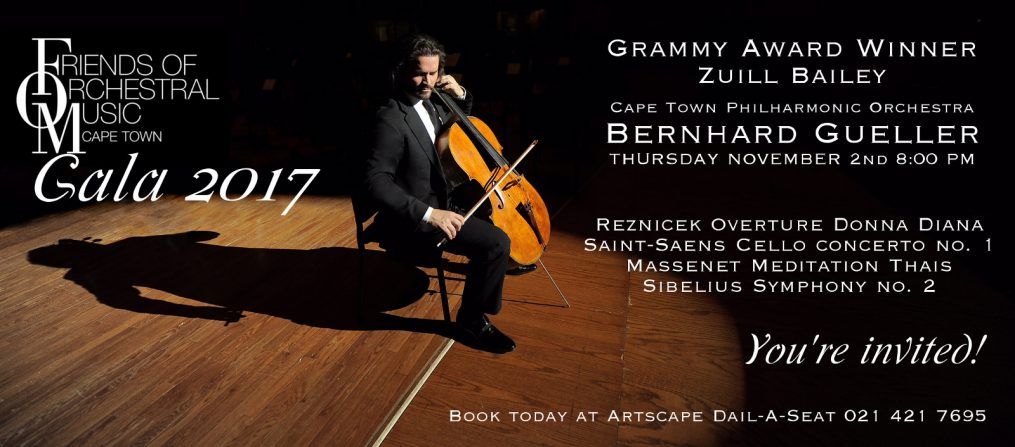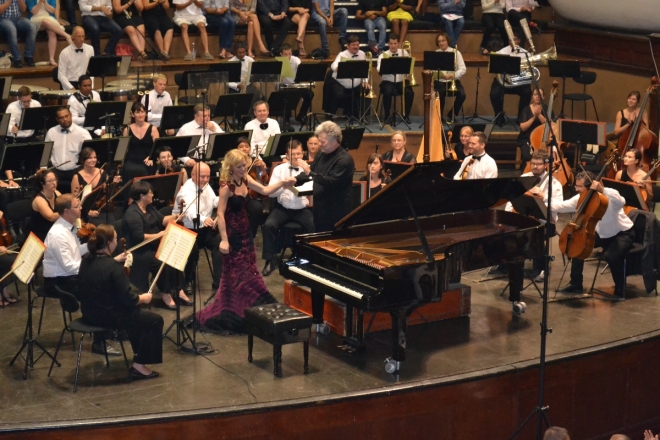Reviewed by Andy Wilding
Conductor: Victor Yampolsky
Guest Artist: Jack Liebeck
Cape Town Philharmonic Orchestra, City Hall, Thursday, 18 February 2016
Last Thursday saw the return of one of the worlds finest conductors Maestro Victor Yampolsky, directing rising star Jack Liebeck in the Bruch Violin concerto. The concert was sold out, and to my ear Liebeck’s performance emerged among the highest peaks in recent CTPO concerts, along with Joshua Bell’s Tchaikovsky last year. If I am not alone in perceiving the climbing standard of Cape Town’s classical concerts, then perhaps those who are in a position to support the arts are realising the power that they have to bring out performers of such a high calibre as we have recently seen. If this is the case, then Cape Town is lucky indeed, for art thrives when patrons delight in experiencing the finest quality in the world.
.
Strauss – Don Juan
Virtuosity, however, is in no way guaranteed by generous patronage. It is only by focusing a significant amount of talent, that one achieves skill with an instrument. The tone poems of Richard Strauss are beautiful, notorious, and treacherous reefs that will wreck a lesser orchestra, but last Thursday the CTPO demonstrated virtuosic talent, singular focus, and seemingly limitless ability. Synchronous strings, breath-taking winds, and emphatic solos were a reminder of the brilliant Symphonie Fantastique two weeks ago, and that clearly, Cape Town has a world class orchestra, capable of performing the most challenging works in the repertoire. Brass were absolutely amazing, their finale theme shining over shimmering violins. Maestro Yampolsky’s conducting is always a pleasure to watch. He has a Karajanesque flare for dramatic timing – a master of accuracy, sensitivity, and surprising dynamics.
.

Jack Liebeck’s Bruch – an extraordinary performance of a delightfully high standard.
Bruch – Violin Concerto No. 1
Liebeck’s entrance was a velvety soft cover for laser accuracy, that quickly became intense and exciting. The first subject revealed his virtuoso, as well as a sensitivity to changes, and a foresight to align himself before they happen. If he were a racing driver, there would be a glass of champagne on the dashboard with not one drop spilled after the race, and he would have won. It was easy to enjoy the smooth fast ride, searing flourishes, and heroic balance with the orchestra. His interpretation was fresh and vibrant and gave a sense of continuity without missing anything important emotionally. The adagio arrived with little warning, just the onset of a sublime moment as wonderful as anyone could desire, lovely support from the violas. The entry into the finale was surprising, like the pounce of a panther. It was an extraordinary performance of a delightfully high standard.
If you run you can catch Liebeck’s performance with Amandine Savary at the Baxter this Saturday 20 Feb 8pm! Debussy, Beethoven, Lalo, Brahms
http://www.ctconcerts.co.za/concerts/jack-liebeck/
.

Conductor Victor Yampolsky and concert master Suzanne Martens after Brahms Symphony 4, Cape Town Philharmonic Orchestra
Brahms – Symphony No. 4
There was something about the opening of this work that felt like the beginning of a voyage – leaving port in fine weather, venturing into the open ocean, secure in the hands of an experienced captain. (Orchestra CEO Louis Heyneman used a similar metaphor at the reception after the concert!) One could be forgiven for imagining a huge steering wheel on Yampolsky’s podium. In fact, he seemed to be conducting not only the ship, but also the ocean, surging and receding in delicious rich colours. His tempi were exciting but responsible, and we felt safe even in the high swell, as he artfully navigated through Brahms’ frequently overlapping currents of 2 beats against 3.
The andante was an enchanting fluid legato, searching deeply and discovering profoundly.
.










